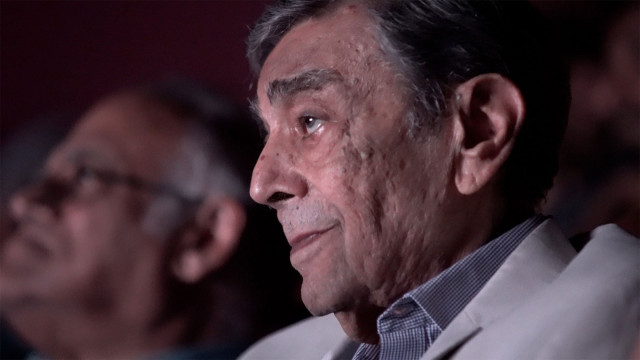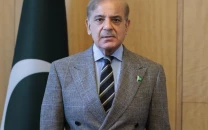When legends move on
Remembering Amjad Islam Amjad and Zia Mohyeddin in a few words is not possible.

All the world’s a stage,
And all the men and women merely players;
—William Shakespeare
True, but let me add that all are not equal players. Some play their part and exit, and are soon forgotten, while some leave an indelible mark on the hearts and minds of millions of people for years to come. They are remembered with affection even by those who never met them.
We have been blessed to have many such people who can undisputedly be called icons in their fields as we proudly own and honour them.
Sadly, in a matter of a few days we lost two icons who left such a void that would never be fulfilled. Amjad Islam Amjad and Zia Mohyeddin ― two stars of our literary world ― left us too soon. Suddenly, and one after the other, so that their fans and admirers, mostly of Urdu literature and performing arts, didn’t even get a chance to recover from one loss, and they had to bear another.
With the passing of these two great men our world of literature and performing arts is shaken and their fans heartbroken. Many are wondering, will the country produce more like them. Most are doubtful. There will come good poets and writers and artists, but there can be only one Amjad Islam Amjad and one Zia Mohyeddin, as the likes of them are not born again and again.
They lived their lives on their terms, yet in doing so left us treasures of incomparable wealth in the form of books, plays and television and film performances, which would be enjoyed and cherished by generations to come. They will be in our hearts and minds and we are lucky that their books, plays, and recordings will be available to us and the generations to come, thanks to modern technology. While many were fortunate to have heard them recite in gatherings over the years, now we will have to depend on CDs and YouTube to listen to them ― sadly, there won’t be any more live sessions with them.
Those growing up in the late 1970s and early ’80s still remember the drama serial Waris penned by Amjad Amjad Islam, aired on PTV in 1979-80. It became so famous that the two names became synonymous and till now the mention of his name or the play evokes memories of the other. One wishes more plays could be written like this.
Amjad Islam Amjad (August 1944 ― February 2023), educationist, poet, screenwriter, playwright, and lyricist, was born in Lahore and received his education there, receiving his master’s in Urdu literature from Punjab University. After a brief stint at teaching at MAO College, Lahore, he joined Pakistan Television Corporation and worked as director from 1975 to 1979, before returning to teaching.
Amjad has been a prolific writer and mastered many genres, such as plays, essays, poems, and columns, though his focus was on writing nazams. His depth of thought and careful use of similes and metaphors made him one of the most popular poets of his age. He is known as the house-hold poet of the country, mainly because of his captivating poetry. He was a regular at poetry sittings over the last four decades where people loved to listen to him. He would say that “my readers remember my blank verses due to the rhythm rather than the thought in them”.
Since the publication of his first book Barzakh in 1974, he has published several collections of poetry, including Saatvaan Dar (1978), Fishar (1982), Baarish ki Aawaz (1997), Phir Yun Huwa (2003), Mohabat Aisa Darya Hai (2004), Yahin Kahin (2006), etc.
Along with that, he also translated poems by African poets from across the world, titled Kalay Logon ki Roshan Nazmain; published in 1980, it carries works by poets from Tanzania, Angola, Mozambique, Ghana, South Africa Senegal, and the US.
Starting his career with Ya Naseeb Clinic in 1972, he wrote many plays for PTV, some of which are still remembered as masterpieces. His drama serial Waris made him a house-hold name and turned out to be a trend setter by faithfully portraying Punjab’s rural life and contrasting it against the educated urban class, and is still considered one of the most popular plays ever telecast on PTV. Some of his other well-known dramas are Dehleez (1981), Samandar (1983), Raat (1987), Waqt (1986), and Apnay Log (1985), though there are many short and long plays to his credit.
He also published a travelogue, Shehar Dar Shehar, in 1988 about his travels to major cities.
He served as deputy director of the Punjab Arts Council for four years from 1975 till 1979 and then as director general of Urdu Science Board in 1997. In 1989, Amjad was appointed as Director General of Urdu Science Board. He has also worked as a project director of the Children Library Complex. In June 2008, he joined the Urdu newspaper, Daily Express, and wrote a column titled “Chasham-e-Tamasha”.
In recognition of his creative craftsmanship, he was honoured with numerous domestic and foreign awards, including Pride of Performance and Sitara-e-Imtiaz (Star of Excellence), as well as Writers’ Guild Award (1976), 16 Graduate Awards, and 12 PTV awards for the best writer, besides two Nigar Award for Best Film Writer.
In 2019, he was honoured by Turkey’s President Recep Tayyip Erdogan with the Necip Fazil International Culture and Art Award. Addressing the ceremony, the Turkish leader is noted to have said: “Amjad Islam Amjad is one of the most important poets in modern Urdu literature.”
While the literary circles were still mourning the passing of Amjad Islam Amjad, they suffered another heavy blow with the passing of Zia Mohyeddin. Considered a legend and rightly so, Mohyeddin was an accomplished actor, director, television broadcaster, and orator, and had unparalleled mastery over prose recitation and theatre direction.
Rewind to the early 70s. While TV was still black and white, the excited audiences saw this stylish, handsome lean fellow in bell-bottoms or smart boot-cut pants, wearing a tuxedo now and again or a double breasted jacket, a long chain and locket round his neck, shiny broad toed shoes. With his flamboyant vibe, fashionable side-burns, engaging smile and the devil in his eyes, fluent English and impeccable Urdu, he would spell-bind his live audiences on stage. He not only introduced guest such as Z.A. Bukhari and Mushtaq Ahmad Yusufi with aplomb, he sang and danced with Runa Laila, he was graceful, confident and the audiences in Pakistan had not seen a stage show, at least of this calibre before. This was Zia Mohyeddin doing his Zia Mohyeddin Show with a live audience. People not only loved him and his show, but his content, his Shakespeare recitals, his signature ‘lagay theka’ cue to the musicians to start the beat for his recital was stuff that pioneers do and he was a showman to the core. Everybody else just followed the pattern to this day.
Born in 1931, in Lyallpur (now Faisalabad), Mohyeddin studied theatre at London’s Royal Academy of Dramatic Arts (RADA), one of the world’s foremost acting schools. He is among the few Pakistanis to have performed in theatre and films outside the country. Following his roles in Long Day’s Journey into Night and Julius Caesar, he joined the West End Theatre playing Dr Aziz in A Passage to India in 1960; he made his film debut and delivered some of his most memorable performances in Hollywood epics, like Lawrence of Arabia (1962), Behold the Pale Horse (1964), and Bombay Talkies (1970).
He returned to Pakistan in the late 1960s and made his local big screen debut in Mujrim Kaun (1970). He gained fame from his blockbuster PTV talk show, Zia Mohyeddin Show, which ran from 1969 till 1973. He was appointed director of the PIA Arts Academy in 1973, a role that he held till 1977.
However, due to heavy censoring during Gen Zia’s military regime he returned to the UK, where he produced Central Television’s (now ITV Central’s) flagship multicultural programme Here and Now (1986–1989), a weekly magazine series highlighting the culture and lifestyle of various minority communities. He also starred in British director Jamil Dehlavi’s Immaculate Conception (1994) and the critically acclaimed mini-series, The Jewel in the Crown (1984).
He was the first Pakistani to have worked in Hollywood, contributing richly to both Pakistani and British cinema and television throughout his illustrious career.
In February 2005, then President Pervez Musharraf entrusted him with the task of forming the National Academy of Performing Arts (NAPA) in Karachi. As founding chair and later the president of NAPA, he mentored aspiring artists in a variety of performing arts; his students include some of the country’s biggest acting talents. His students claim to have benefitted a lot from his tutoring.
Mohyeddin authored three books, namely A Carrot is a Carrot (2008), Theatrics (2012), and The God of My Idolatry: Memories and Reflections (2016).
He was conferred with Sitara-i-Imtiaz (2003) and Hilal-i-Imtiaz (2012) for his contribution to the arts. He was also presented with a Lifetime Achievement Award on November 29, 2017, in United Arab Emirates.
Whether he was reciting poetry or prose, whether Shakespeare’s play or marsiya tahtul lafz, it was punctuated with, and at the right places, dramatic pauses and varied nuances. He had garnered a reputation for being the most fluent and forward reciter of Urdu literature, who gave Urdu poetry and prose recitations the excellence they deserve, while his readings of English prose were remarkable.
There is no doubt that Zia Mohyeddin was an icon, a trailblazer, and a thespian par excellence. As Chairman NAPA, Syed Jawaid Iqbal, said, his art was one of its kind and his unique style was admired not just in Pakistan but across the world. He will continue to live through his work, his students, and successors. Being the brilliant teacher that he was, he mentored and trained numerous students of theatre. He was a committed professional and set the highest standards of academic excellence and integrity.
The fact that these two great men were awarded at the state level is recognition of their talent but they did not work or live for these awards. They followed their hearts and what they have left behind is testament to that. That they were recognised and showered with accolades is like icing on the cake.
Their work speaks for them and they live through it. To quote Shakespeare again, as his words fits these two greats equally:
So long as men can breathe, or eyes can see,
So long lives this, and this gives life to thee.
They are not easily replaceable. In Shaad Azeemabadi’s words:
Dhoondo ge agar mulkon mulkon
Milne ke nahi nayab hain hum
Rizwana Naqvi is a freelance journalist and tweets @naqviriz; she can be reached at naqvi2012rizwana@hotmail.co.uk. All facts and information are the sole responsibility of the writer



















COMMENTS
Comments are moderated and generally will be posted if they are on-topic and not abusive.
For more information, please see our Comments FAQ